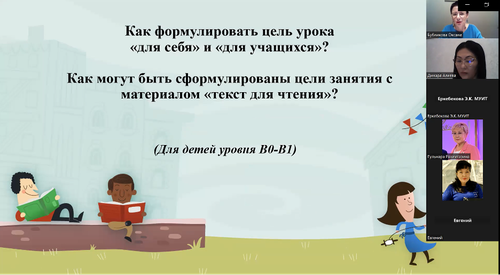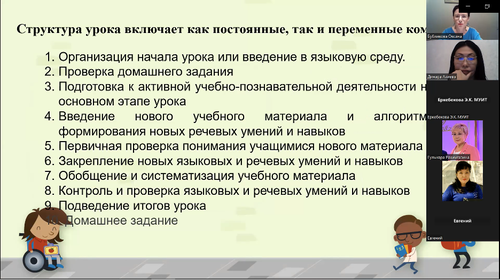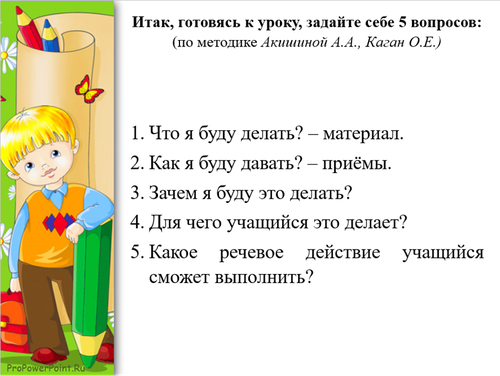On November 19, 2022, a methodological seminar was held on the topic "How to formulate the goal of the lesson for yourself and for students". At the seminar, IITU experts told teachers how to formulate the objectives of the lesson with the material "text for reading" for children of level B0-B1.

This time the training was held in a new format: before the start, the teachers were asked to answer a few questions, after which the speakers – language experts of the IITU Oksana Bublikova and Dinara Alieva, spoke about the peculiarities of the methods of teaching the Russian language at the B0 and B1 levels.
“In RFL, before planning and structuring a lesson, we take three goals as a basis: teaching, developing and educating. We must clearly understand what we want to get as a result of each lesson, and be able to ask ourselves questions about the goal that will help manage the structure of the lesson to get the result, ” Oksana Vasilievna said.
In her report, she referred to the works of such authors as Kryuchkova Lyudmila Sergeyevna, Moshchinskaya Natalya Viktorovna, Schukin Anatoly Nikolayevich, Akishina Alla Aleksandrovna and called for a careful approach to the formation of the goal in order to arrange a clear and effective lesson.

Oksana Vasilievna noted that there can be no pure methodology. According to her, it is always a combination of methods, and it is impossible to work using one method. Therefore, the experts considered the approaches of different authors and chose for the presentation what is most applicable to the teachers involved in the Akelius project .
“Akishina developed 5 rules and I encourage teachers to follow them. The first rule is to prepare for the lesson by asking yourself 5 questions, we will discuss them in more detail later. The second rule is timing. The third rule is a positive attitude towards the audience. The fourth rule is to keep the pace of the lesson from beginning to end. The fifth rule is attention to each student, ” Oksana Vasilievna reminded.

(Picture) While preparing to the lesson, ask yourself five questions (based on the methodology by Akishina A. A. and Kagan O.Ye.):
- What will I be doing? - material
- How will I deliver it? – methods
- Why will I be doing it?
- Why will the learner be doing it?
- What speech action will the learner be able to perform?
Dinara Asylkhanovna, in turn, noted that B0 level is fully based on working with the text. Here the effect of a quantum leap is observed – tasks become more difficult, and the time allotted for their implementation remains the same. Thus, at this stage it is important to keep the children motivated to study. According to her, educational texts are often not interesting for children.
“Too simple texts do not allow students to reach a new level of knowledge of the language.
Students are interested in unadapted texts, which push them to a new level. Working with this type of texts, we use the sensory perception of students. In RFL, the learning process is built on relaxation and enjoyment of the lessons. Therefore, we recommend giving a creative task when working with a non-adapted text, for example, imitating, showing what is described in the text to attract children's interest in the topic,” Dinara Asylkhanovna advises.
During the training, she, together with the teachers, analyzed the text for level B0, which is available on the Akelius platform , and showed how to work with it. Among the proposed tasks were the following: break the text into paragraphs, determine the micro-theme of each paragraph, draw up a simple plan, form questions on the content of the text.
“At RFL we work on the ability to form and ask questions. Depending on the level of the group, the task can be differentiated: for weak children, we give simple, so-called "subtle" questions, for strong we give questions on the understanding of the text. And then suggest the children making up questions on the text themselves,” Dinara Asylkhanovna notes.
Recall that IITU has been participating in a joint project with Akelius and UNICEF since November 2021. This initiative is aimed at the socialization of children in difficult life situations. The project involves 9 schools in Kazakhstan, where teachers conduct classes in the blended learning format using the Akelius platform.
By the time the pilot project is completed in early 2023, 250 children are expected to be trained on the Akelius platform, and the blended language learning methodology will become examples for improving literacy in other courses and teaching in a digital environment.
